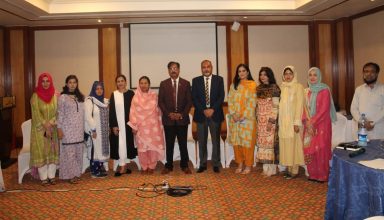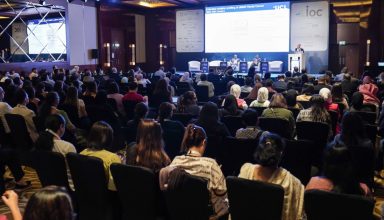PNDS is the foremost society for Nutrition professionals in Pakistan call to increase taxes on sugary drinks

The diet related Non communicable Diseases (NCDs) are skyrocketing in Pakistan. Unhealthy diet and sugary drinks are the major cause of obesity and many fetal diseases like diabetes, ischemic heart diseases and stroke. The PNDS demanded FBR and Ministry of Finance to increase federal excise tax in the 2023-24 finance bill, on all types of sweetened drinks to reduce the diseases burden. This was said during the seminar on “Public Health Law and Nutrition Outcomes: The Case of Sugar Sweetened Beverages” organized by PNDS in collaboration with Pakistan National Heart Association at local hotel in Karachi.
Ms. Fayza Khan, President PNDS addressing a Seminar said that favorable government action and policies can create an enabling environment for ensuring access of healthy diet to our population as unhealthy diets is one of the leading risk factors of non-communicable diseases. 41.3% of adults being overweight or obese, and 6 out of 10 deaths attributed to NCDs, there is an urgent need for government interventions. As per WHO, 58 % of total deaths were contributed by NCDs in Pakistan & the rise in obesity and NCDs in Pakistan has become a significant public health challenge primarily due to unhealthy diets and lifestyle. She said that fiscal policies like taxing sugary drinks can help cut down the diseases burden and the revenue generated may be allocated to promote the nutrition education.
This event was attended by nutritionists, public health specialists and other healthcare professionals. First speaker of the session Dr. Sumaira Nasim, Assistant Professor at the School of Public Health Dow University of Health Sciences, Karachi highlighted the causes of high consumption of SSB in Pakistan and its impact on physical and mental health. She identified a lack of research conducted in Pakistan. She identified the negative role of media advertisement, the food industry and the lack of awareness regarding the hazards of SSB even among healthcare professionals.
She emphasized involving different stakeholders such as parents, school associations, nutritionists and other healthcare professionals, policymakers, celebrities, and media. Awareness using different media platforms, particularly Word-of-mouth (WOM) via social media can be an effective strategy to reduce consumption, particularly among youth.
Mr. Munawar Hussain, Consultant at Global Health Advocacy Incubator (GHAI), said that increasing taxes on sugary drinks is an evidence-based policy action to reduce their consumption, obesity and related diseases. While referring to modelling study by world bank he said “If the FED on all sugary drinks is increased to 50 per cent, it would help generate the annual economic value of health impact of $8.9 million and achieve the health gain of 8,500 Disability Adjusted Life Years (DAILYs).” He added “the average annual tax revenue would increase to $810 million for the next 10 years”. This may enable government to earmark and increase budgetary allocations for public health programs and nutrition education.
Secretary General of Pakistan National Heart Association (PANAH), Mr. Sanaullah Ghumman said that PANAH is thankful to all those voices which are raised to cut down the consumption of unhealthy diet to reduce the disease burden and hospital expenditure. He said that beverage industry is misleading policy makers at every step and creating barriers to the policy process aimed at reducing consumption of sweetened drinks. The government should give priority to public health instead of corporate interest and increase tax on all sugary drinks in coming budget of 2023-24 scheduled to be presented in the parliament in June.
Seminar was followed by a Panel discussion of the Nutrition & Public Health policy experts on How to combat the challenges to decrease consumption of sugar-sweetened beverages.
[email protected] source: biztoday

